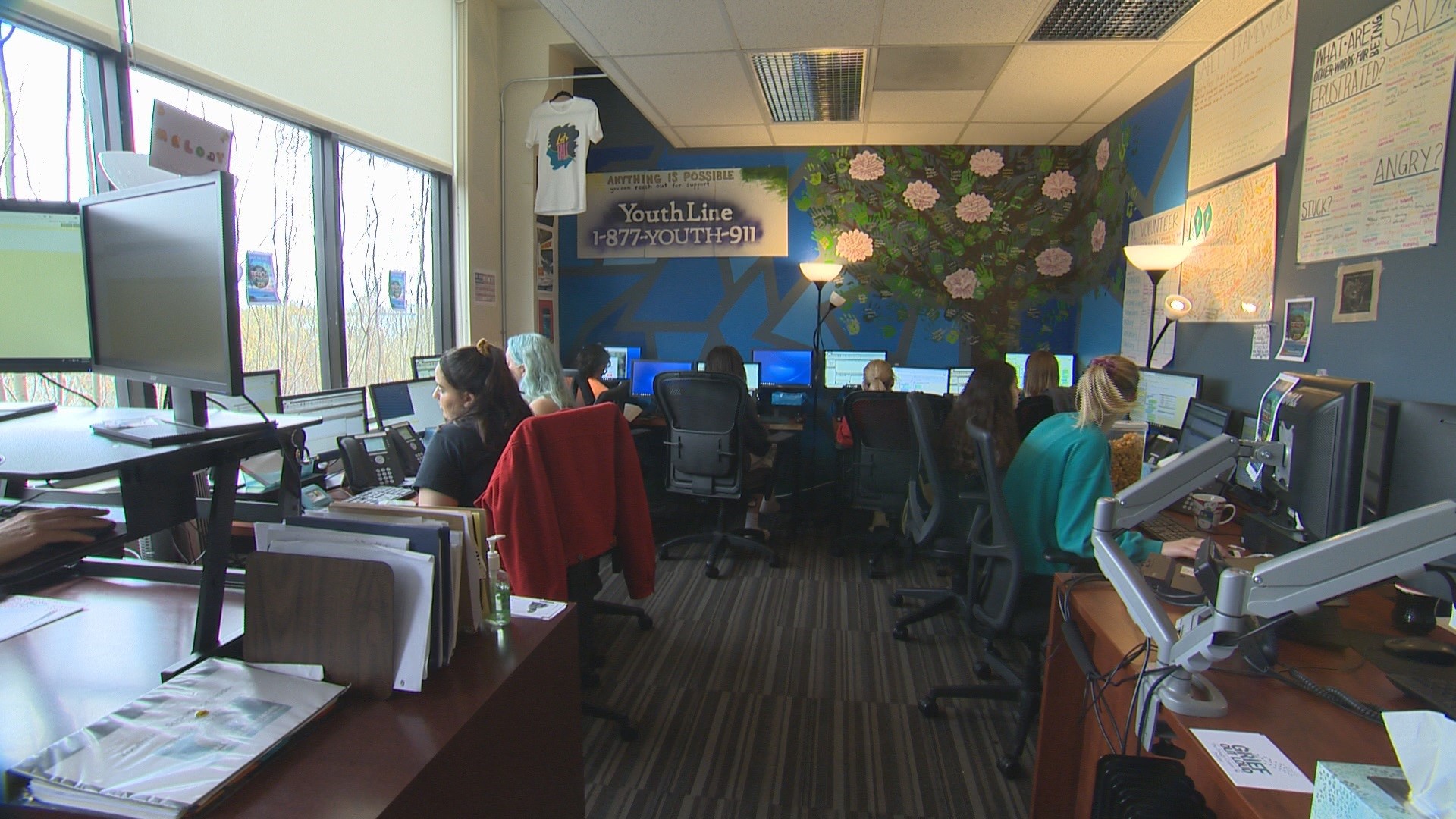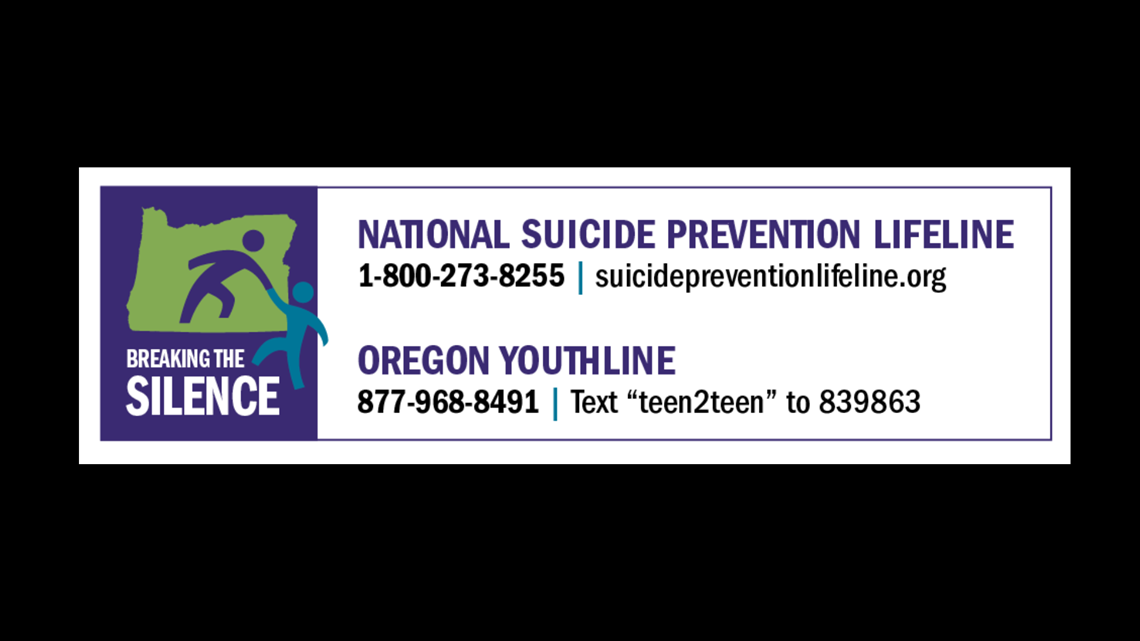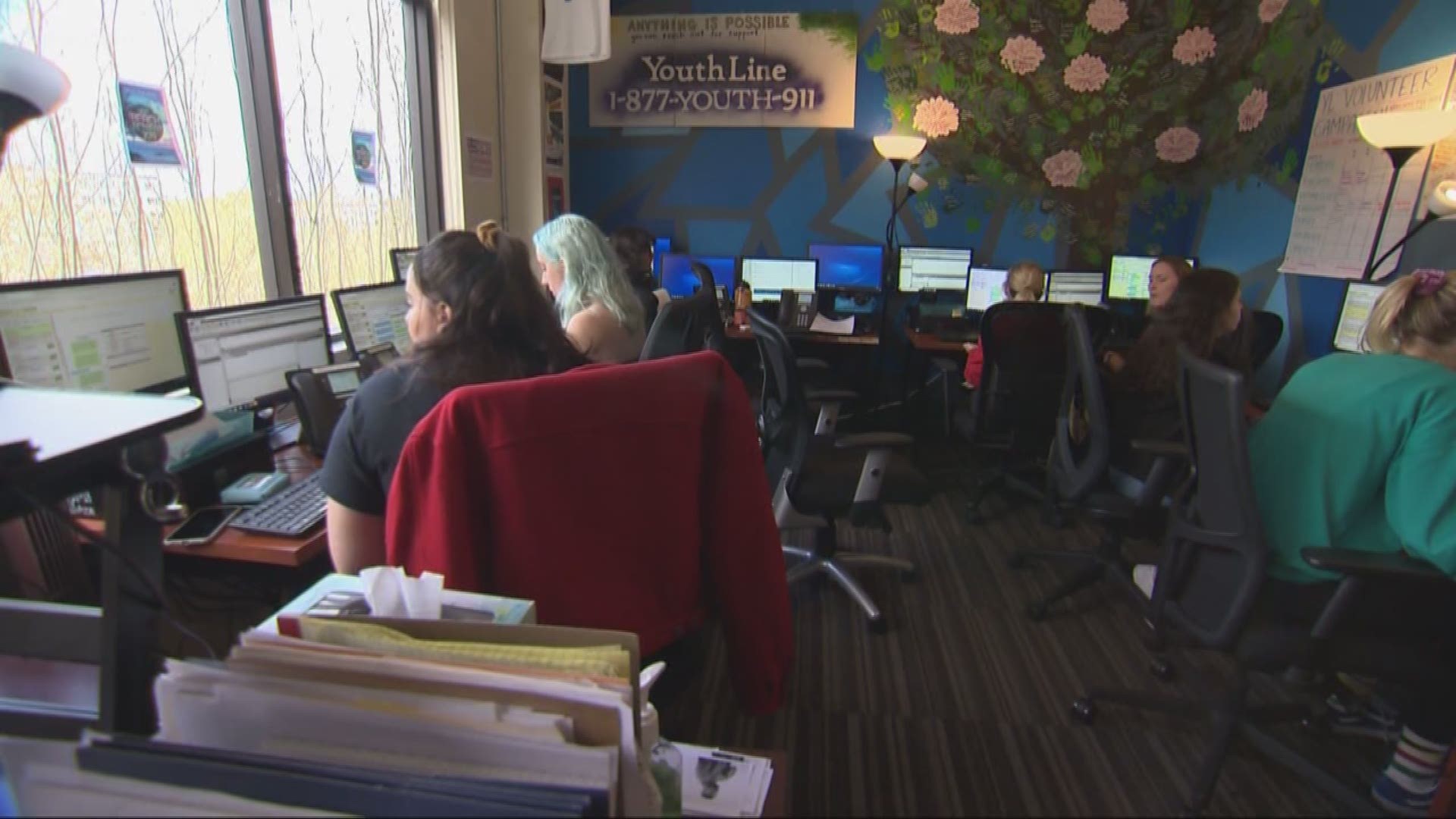Breaking the Silence: YouthLine serves as critical resource for teens in need
YouthLine is a crisis and support line made up of teen volunteers. Volunteers say struggling youth reach out because they just want to be heard. By listening, volunteers are helping save lives.

Oregon is facing a crisis surrounding death by suicide, and our youth are not immune.
Suicide is the second leading cause of death among 10-24 year olds in the state. Suicide rates in Oregon have remained higher than the average rate in the U.S. for the past decade, according to the Oregon Health Authority.
This week, KGW is participating in a collective movement with media across the state to break the silence, and help prevent death by suicide. In that effort, we are highlighting an incredible resource for struggling teens based in Portland.
YouthLine is a crisis and help line affiliated with Lines for Life, and made up of teen volunteers.
It's one of only a handful peer-to-peer lines in the world.
YouthLine Volunteers "People just want to be heard"
Calls and chimes for help fill the small room where teenage volunteers dedicate their time and hearts to helping their peers from Oregon and all over the globe.
"We talk to a lot of people for whom YouthLine feels like only source of support they have,” Gabrielle Paisner, an 18-year-old YouthLine volunteer, said.
"We are currently in this environment and living some of these experiences, so I think we can provide a level of relatability that some adults can't,” lead volunteer Zakia Elazami added.
Elazami says she grapples with her own mental health.
"Sometimes I have bad days,” she said. “I don’t think I am in a position of crisis anymore and I think that's why I'm able to do this work.”
When a family member cried out for help on social media, she realized all it takes is making the connection.
“They just felt like they had no where to go,” Elazami said. “I kind of had this realization maybe just reaching out to people, having individual conversations with people, doing that work to de-escalate and connect with people can make this massive difference sometimes. And it’s such a simple thing, and I think because it’s so simple we overlook it really easily.”
She believes people just want to be listened to, have their feelings and emotions validated, and to be told their crisis is real. Elazami says our society can fail struggling youth by downplaying or dismissing their crises sometimes.
“Feeling heard and feeling understood is what allows people to find that hope for themselves. I don't think we provide it for people; I think we give people the space to find it in themselves,” she added.
That hope has kept Gabrielle Paisner coming back to volunteer at YouthLine for the last two years.
"We get to play a role in the larger task of changing the culture surrounding suicide and mental illness,” Paisner told KGW. “It feels good to be able to be a part of that.”
Contacts to YouthLine
At YouthLine, volunteers work to break apart the stigma surrounding mental health and suicide. One of only six teen-to-teen support lines in the world, volunteers talk to people over the phone, chat, text or e-mail.
They help normalize the things contacts are going through while helping with battles, from suicidal ideation to mental illness, relationships, sexual abuse or just a bad day.
"Letting someone know you are open to having that conversation and aren’t going to shy away from this difficult situation really means the world for a lot of people,” Paisner said.
YouthLine Outreach Specialist Parker Sczepanik said they had about 14,000 contacts last year.
“Yeah, that’s a lot of youth that are struggling, looking for support, going through something. But really what it means is that...these youth are feeling empowered to contact somebody and actually talk about what’s going on for them. Which is part of that process,” Sczepanik said. “Just the act of being brave enough to reach out for helping hand or support any way whatever capacity is huge.”
Volunteers aren't given contacts they're uncomfortable with. Paisner says if a contact is actively suicidal, they have a net of support around them, including supervisors in the room at all times.
Outreach & Education YouthLine staff and volunteers spread awareness in schools and community
Volunteers and Sczepanik also do outreach and education in schools and at training and events the community.
"We have our contacts here but also go out into the community and are able to talk with people about their experiences. And little by little each event we do we work to break down that stigma," Paisner said, "and just have open conversations with people and really honest conversations. We let people know they’re not alone."
YouthLine offers 45- to 90-minute classroom lessons across Oregon to help teens cope with life stressors. Teen volunteers join staff to share their expertise, and offer a relatable voice.
The nonprofit also offers customized courses and consultation services to create a training that fits whatever a volunteer needs. Their materials provide helpful resources for teachers, counselors, and doctors to educate students and patients across the state.
What Volunteers Learn Volunteering is a three-legged stool
YouthLine training provides a better understanding of mental health, as well as a healthy attitude toward mental illness and suicide.
“The skills we learn here, they don't just stay confined to this room,” Paisner said. "I take them with me everywhere I go."
These teen volunteers are able to go out into the community and have uncomfortable and, at times, painful conversations with their peers, loved ones, or other people in their lives.
In addition, they're growing personally and professionally along the way.
Sczepanik says they refer to YouthLine as a three-legged stool: One component is the crisis and support line, another is outreach in communities through education and awareness, and the third is professional and personal growth.
"We’re recognizing our youth are growing all sorts of ways that maybe they didn't expect, and we didn’t expect,” she added.
Volunteers are surrounded by a nonjudgmental, supportive network of people. In the small room, they're able to find lasting friendships and a niche.
Elazami says when she’s struggling she has a great community there who will listen and take her seriously. She feels validated in that.
“When I first came to YouthLine I was still holding some of that shame and stigma with me about my own mental health, and I think being in this completely nonjudgmental and welcoming environment has helped me shed some of that and move past it,” Elazami said.
All of these rewards and unanticipated benefits occur while these teens are able to stamp a lasting impact on the world.
Get Involved
The YouthLine team must go through hours of extensive training and certification to do this work. They give three-and-a-half hours of their time each week.
There are around 100 youth line volunteers currently. But many are graduating soon, so there's a need for more.
Teen volunteers are there operating the phones and chatting from 4 to 10 p.m. every day.
You must be between 15 and 20 years old and live in the Portland Metro Area to volunteer locally, or the Central Oregon Tri-County Area to volunteer at the new satellite office. You have to commit to volunteering for at least one year and complete all orientation and training requirements.
If you're interested, email YouthL@linesforlife.org.
Resources Suicide is preventable
To get help from YouthLine, call 877-968-8491.
You can also text "teen2teen" to 839863.
Online, you can live chat using this lifeline tool.
Teens can also email: teen2teen@Linesforlife.org
If you or someone you know needs help, reach out to the National Suicide Prevention Lifeline. The number is 1-800-273-8255. People are available to talk 24 hours a day, every day.
Breaking the Silence


This month, newsrooms across the state are highlighting the public health crisis of death by suicide. Our goal of “Breaking the Silence” is to not only put a spotlight on a problem that claimed the lives of more than 800 Oregonians last year, but also examine research into how prevention can and does work and offer our readers, listeners and viewers resources to help if they – or those they know – are in crisis.
Most of our work will be published and broadcast April 7-14. The participating media outlets are using a common set of data and have loosely coordinated their coverage in an effort to avoid duplication and better amplify all of our work. When possible, we will promote each other’s stories, but all of them can be found on breakingthesilenceor.com


